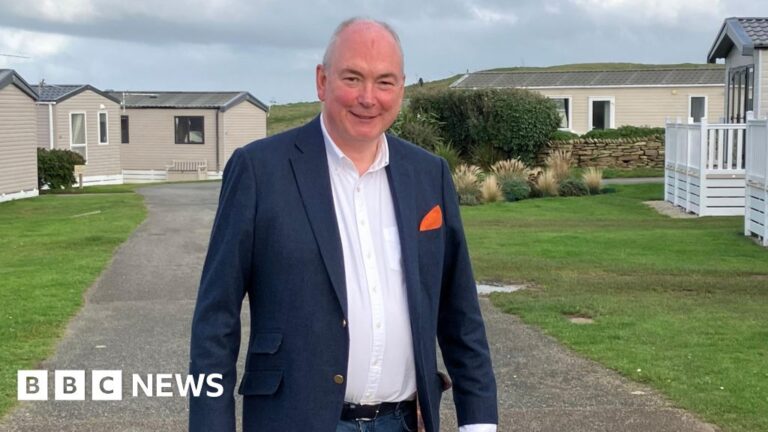Seb NobleCornwall political reporter
 BBC
BBCMore employers in Cornwall have been urged to pay their staff the real living wage to help reduce in-work poverty.
The Living Wage Foundation said about 300 businesses – employing about 15,000 people – currently paid the real living wage in Cornwall.
Truro Foodbank said it had seen a drop in the number of people accessing it for support over the past two years since more employers began paying higher wages.
However, the Federation of Small Businesses warned it could be difficult for some to commit to paying it – as the cash flow for those in sectors like hospitality and tourism can often depend on variables like the weather.
The national living wage is the minimum businesses must legally pay employees and is currently set by the government at £12.21.
However, campaigners argued the real living wage should be £13.45 so people could pay their bills, meet transportation costs and save money for an emergency.

Simon Fann, chair of the Cornwall Living Wage Place Group and manager of Truro Foodbank, said 30% of those accessing the foodbank in 2023 had been in employment.
“Nobody wants to see people go to foodbanks, particularly those in work,” he explained.
“If helping people on the lowest possible pay and insecure hours is one way of reducing the numbers that’s fantastic.
“This is something where we can make a demonstrable difference and it’s about choices and values at the end of the day,” he argued.

Patrick Langmaid, managing director of Mother Ivey’s Bay Holiday Park near Padstow, said paying the real living wage helped him attract and retain employees.
“I’m not having to spend as much recruiting. I’m not having to spend as much training. So I’m getting more value,” he explained.
“I have always felt your team is an investment. Pay what you can rather than what you can get away with. That would be my encouragement to everybody.”
Warren Constance, a maintenance worker at the park, said receiving the real living wage made a big difference to his mental health.
“You feel more valued because of the money you’re getting so you tend to do a better job,” he explained.
He added the cost of transport and housing in Cornwall made paying the real living wage essential: “I refer to the national minimum wage as an ‘existing wage’ because you just exist on £12.21 an hour. You don’t really live.”
However, Ann Vandermeulen, from the Federation of Small Businesses in the South West, said trade-offs could have to be made if employers pay the real living wage.
She said: “They’d have to look at how many staff first of all, do they cut staff?
“We rely quite a lot on tourism. If it’s raining then you don’t have such a good day as if it’s sunny – so there’s a lot of variables that they have to take into consideration.
“It’s very difficult for businesses to plan to have a consistent cash flow. So they need to keep something in store for those emergency times,” she explained.



